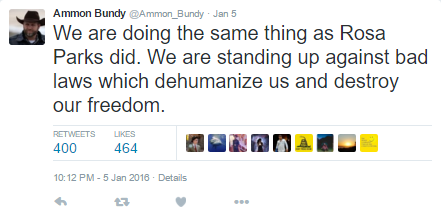Oregon militants’ “protest” warrants punishment under law

On Jan. 2, approximately a dozen armed ranchers seized the headquarters and visitor center of Oregon’s Malheur National Wildlife Reserve. Ammon Bundy (above), the leader of this militant occupation, claims that the conflict in Oregon represents a stand against government “tyranny.”
January 12, 2016
The occupation of the wildlife refuge building in Oregon has evolved into a controversy surrounding gun control laws. Ammon Bundy, the leader of the group of armed men who have seized the federal building, frequently discusses a tyrannical government violating constitutional freedom, while he strives for recognition in the media as a freedom fighter.
The incident arose when Bundy assembled several men to protest the arrest of Dwight Hammond Jr. and Steven Hammond. According to prosecutors, the Hammonds were convicted in 2012 for arson of 130 acres of federal land, but after a sentence of one year, prosecutors deemed it necessary to extend their sentence to five years. On Jan. 2, the day after the peaceful protests to reduce the Hammonds’ sentence, Bundy and his armed affiliates occupied buildings in the Malheur National Wildlife Refuge. In a video, Bundy stated that he and his supporters want to restore the glory of Harney County by freeing the land under Malheur National Wildlife Refuge. He invites people across the country to arm themselves and join him in the standoff against a “tyranny.”
These militiamen of Oregon portray themselves as heroes. But what is heroic or patriotic about breaking common law? Bundy and his men hold an unsustainable position in violently protesting federal law, and they will soon lose their hold on the wildlife refuge.

Bundy frequently uses social media, including both Facebook and Twitter to convey anti-government ideas. In one of his tweets, he claims his actions compare to those of Rosa Parks. But such a comparison means nothing, since the Montgomery bus boycott was a peaceful protest. Though he labels his actions as peaceful in order to garner support, his crew’s carrying weapons indicates a rather violent intent.
Why must these men go to such extreme lengths to express their ideas? Bundy knows that gun threats are enough to create tension and raise worry in the public. Without weaponry, the militiamen would be quickly shut down by the Oregon sheriff, but the armed threat prevents them from taking immediate action.
In fact, the movement no longer identifies as a protest. Bundy is trying to revive Harney County from its low income state by occupying federal property, at the expense of both the gov. Eventually, Bundy and his men will exhaust their “society” of all resources. Through a Facebook post, Blaine Cooper, one of the militiamen at the refuge, requested “snacks, supplies, or anything useful” to support their cause. The men use sympathy to gain popularity for their actions. However, the post was ridiculed all over the internet.
When the group finally loses all outside support and finally realizes the faults in its actions, it is unacceptable to allow them into society without facing the consequences of their actions. The ranchers would have to be arrested and their agricultural permits revoked. Past legal standoffs have only ended in either violence or a compromise favorable to the protesting group. It will be intriguing to see how law enforcement will prosecute those involved, if their actions will go unnoticed, or if they are arrested. No matter what, armed threats and domestic terrorism should never go unpunished.




![LALC Vice President of External Affairs Raeanne Li (11) explains the International Phonetic Alphabet to attendees. "We decided to have more fun topics this year instead of just talking about the same things every year so our older members can also [enjoy],” Raeanne said.](https://harkeraquila.com/wp-content/uploads/2025/10/DSC_4627-1200x795.jpg)


















![“[Building nerf blasters] became this outlet of creativity for me that hasn't been matched by anything else. The process [of] making a build complete to your desire is such a painstakingly difficult process, but I've had to learn from [the skills needed from] soldering to proper painting. There's so many different options for everything, if you think about it, it exists. The best part is [that] if it doesn't exist, you can build it yourself," Ishaan Parate said.](https://harkeraquila.com/wp-content/uploads/2022/08/DSC_8149-900x604.jpg)




![“When I came into high school, I was ready to be a follower. But DECA was a game changer for me. It helped me overcome my fear of public speaking, and it's played such a major role in who I've become today. To be able to successfully lead a chapter of 150 students, an officer team and be one of the upperclassmen I once really admired is something I'm [really] proud of,” Anvitha Tummala ('21) said.](https://harkeraquila.com/wp-content/uploads/2021/07/Screen-Shot-2021-07-25-at-9.50.05-AM-900x594.png)







![“I think getting up in the morning and having a sense of purpose [is exciting]. I think without a certain amount of drive, life is kind of obsolete and mundane, and I think having that every single day is what makes each day unique and kind of makes life exciting,” Neymika Jain (12) said.](https://harkeraquila.com/wp-content/uploads/2017/06/Screen-Shot-2017-06-03-at-4.54.16-PM.png)








![“My slogan is ‘slow feet, don’t eat, and I’m hungry.’ You need to run fast to get where you are–you aren't going to get those championships if you aren't fast,” Angel Cervantes (12) said. “I want to do well in school on my tests and in track and win championships for my team. I live by that, [and] I can do that anywhere: in the classroom or on the field.”](https://harkeraquila.com/wp-content/uploads/2018/06/DSC5146-900x601.jpg)
![“[Volleyball has] taught me how to fall correctly, and another thing it taught is that you don’t have to be the best at something to be good at it. If you just hit the ball in a smart way, then it still scores points and you’re good at it. You could be a background player and still make a much bigger impact on the team than you would think,” Anya Gert (’20) said.](https://harkeraquila.com/wp-content/uploads/2020/06/AnnaGert_JinTuan_HoHPhotoEdited-600x900.jpeg)

![“I'm not nearly there yet, but [my confidence has] definitely been getting better since I was pretty shy and timid coming into Harker my freshman year. I know that there's a lot of people that are really confident in what they do, and I really admire them. Everyone's so driven and that has really pushed me to kind of try to find my own place in high school and be more confident,” Alyssa Huang (’20) said.](https://harkeraquila.com/wp-content/uploads/2020/06/AlyssaHuang_EmilyChen_HoHPhoto-900x749.jpeg)










